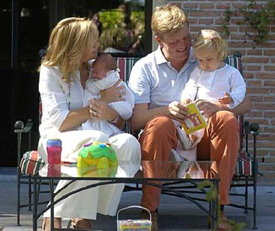Judgment of the Court of Amsterdam dated 6 February 2008 (Willem-Alexander, Máxima, Amalia and Alexia versus Party)
Photographs of Máxima, Amalia and Alexia
In February 2008 the Court of Amsterdam gave a judgment in proceedings brought by Willem-Alexander, Máxima, Amalia and Alexia (the Crown Prince and his family) against the weekly Party (source: LJN: BC3781). The case concerned photographs of Máxima and her daughters Amalia and Alexia at the beach of Wassenaar among other members of the public at the beach. The photographs had been taken by a photographer who happened to be there, so the family had not been stalked and the photographs as such are innocent. Party has argued that its readers like to see that Máxima is also just a mother.
The Court’s Opinion
The Court is of the opinion that publication of the photographs is unlawful and that Máxima, Amalia and Alexia have suffered damage in the amount of €1,000 per person. The considerations of the Court are interesting. First and foremost the Court held that although public figures have to put up with media attention, they are not completely free game. The media do not need permission to publish photographs that contribute to public debate; in such cases the right of the royal couple and their daughters to the protection of their privacy may be outweighed by the right of the media to freedom of expression. However, the photographs that were published in Party do not contribute to public debate. The Court held that the fact that Party’s readers ‘like’ to see that Máxima is also ‘just a mother’ cannot justify the infringement of the privacy of Máxima and her two daughters.
 The Court went on to consider the circumstances under which the photographs were taken, and qualified the outing to the beach as “a moment of domestic life outside of home, when they did not have to be cautious of photographs being taken at that moment that would subsequently be published.” This is a different matter than the photographs of Willem-Alexander and Máxima on the stand of the Olympic speed skating races in Torino, or the photographs of them at the entry of St Nicholas in Wassenaar. According to the Court, these were clearly public events, at which the royal family has to put up with having their pictures taken and published.
The Court went on to consider the circumstances under which the photographs were taken, and qualified the outing to the beach as “a moment of domestic life outside of home, when they did not have to be cautious of photographs being taken at that moment that would subsequently be published.” This is a different matter than the photographs of Willem-Alexander and Máxima on the stand of the Olympic speed skating races in Torino, or the photographs of them at the entry of St Nicholas in Wassenaar. According to the Court, these were clearly public events, at which the royal family has to put up with having their pictures taken and published.
Censorship? Not This Time
Two years ago the weekly Privé, after it had published photographs of the beach holiday of the royal couple in Porto Ercole, was still prohibited for two years from publishing photographs of private situations in which the royal couple and princess Amalia are not acting in the context of their public tasks. Excepted from this prohibition were private occasions of public relevance, publication about which moreover contributes to a public debate on a matter of general interest. This aspect of the judgment against Privé (source: LJN AV7581) has raised quite a few questions, because a general prohibition in advance looked like censorship, and censorship is forbidden.
In the present case against Party the royal family again claimed such a prohibition for two years. This time the Court denied that claim. The grounds for the decision were very brief: the Court argued that in this case Party had not made multiple infringements of the private life of the royal family. Therefore the Court considered that at the moment a prohibition with regard to the future would be too large a limitation of the freedom of expression of the defendants.
Comments
This judgment is in line with the important judgment of the European Court of Human Rights (“ECHR”) dated 24 June 2004 about Princess Caroline and the German tabloid press. According to the ECHR, photographs appearing in the tabloid press are often made without consent and in a climate of continual harassment which induces in the person concerned a very strong sense of intrusion into their private life or may even involve chasing a person. The ECHR considered it important that the sole purpose of publishing the photographs was to satisfy the curiosity of a particular readership, and that it does not contribute to ‘a debate of general interest’. Two of the seven judges of the ECHR rendered a concurring opinion. They did support the conclusion that the protection of the private life of Princess Caroline was not sufficiently guaranteed in Germany, but they opposed the conclusion of the ECHR that it is a decisive factor that news about Princess Caroline does not contribute to any debate of public interest. After all – according to these two judges – there is a large public interest in the ups and downs of the members of high society, and therefore information about them does contribute to a debate of public interest. This argumentation gives the freedom of expression more space, while after a weighing of interests the end result may still be the same.
One question mark is in order with regard to the judgment on the photographs of the visit to the Wassenaar beach. Is a visit to a Dutch beach by Máxima, Amalia and Alexia indeed “a moment of domestic life outside of home, when they do not have to be cautious of photographs being taken and published”? In any case this judgment makes clear that Willem-Alexander and Máxima cannot rely on their privacy when they attend public events. I consider this an appropriate relaxation of the judgment on Princess Caroline, which made no distinction as to the kind of event where a celebrity is photographed.

